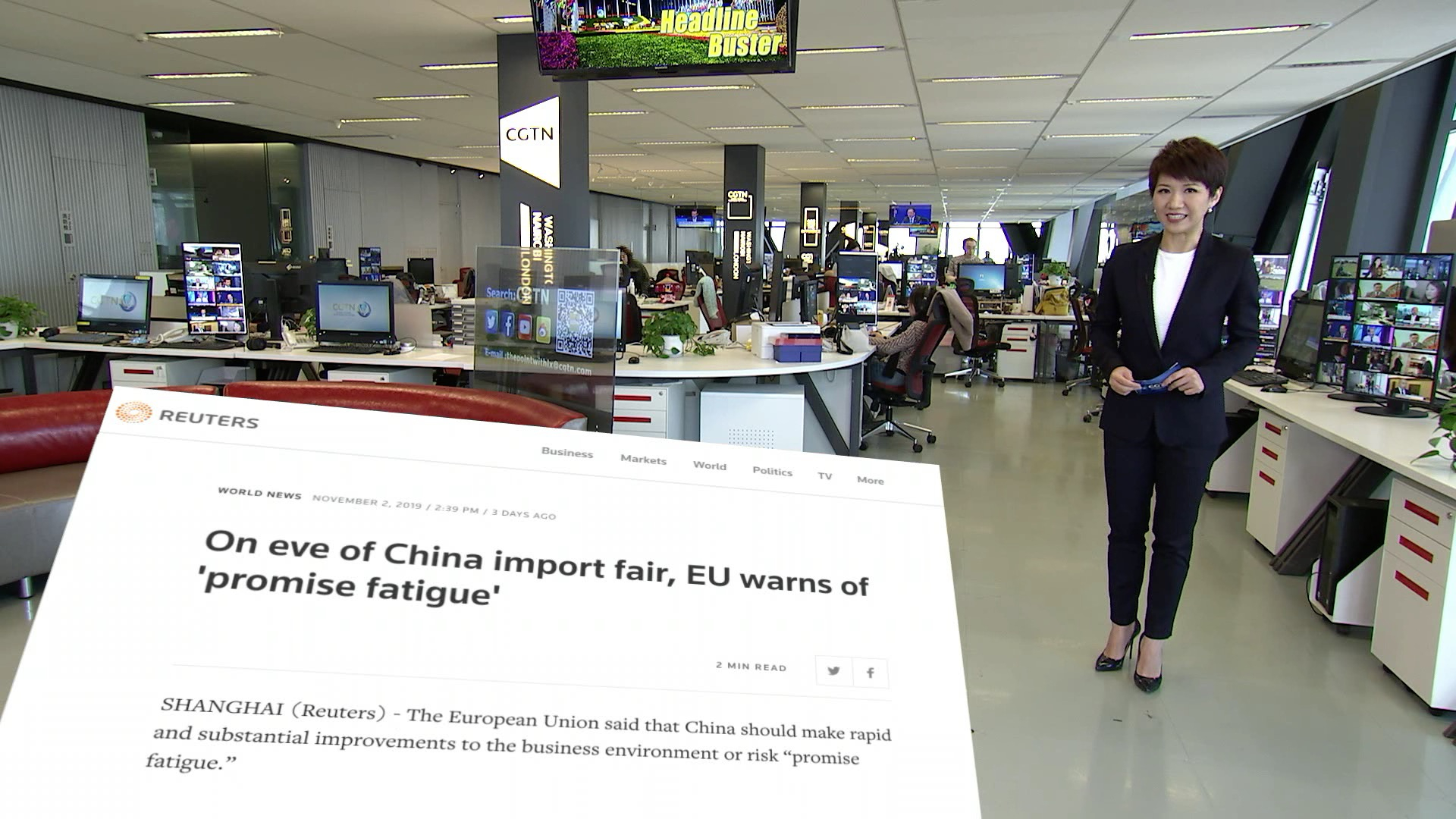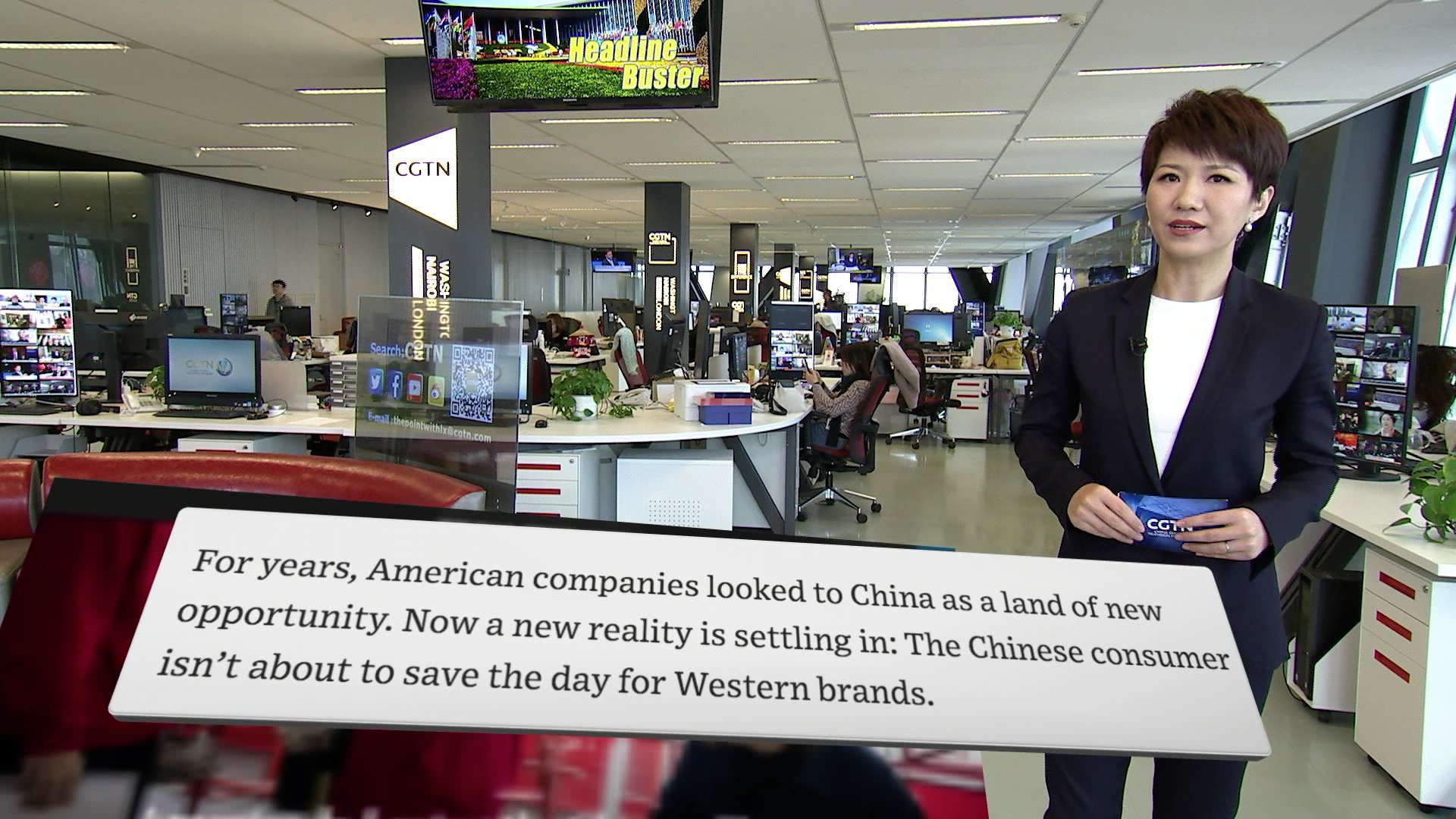10:37

The seconded China International Import Expo, or CIIE, opened in Shanghai on Tuesday. Despite instability in the global economy, exhibitors from around the world have jumped on the opportunity to attend the world's first import-themed national expo, which is even bigger than last year's – a testament to the importance of the event for China and the world.
The venue covers an area of 360,000 square meters, 20 percent larger than last year's and roughly five times the size of the Louvre Museum in Paris.
64 countries, including China, signed up for the country exhibition, which is a 30 percent hike from 2018, with 24 countries making their debut.
Over 3,000 companies from 150 countries and regions have registered for the corporate category, including more than 250 Fortune Global 500 companies. It's also worth noting that despite China-U.S. trade frictions, 192 American businesses have signed up. That's 18 percent more than in 2018 and their space is the largest of all the countries.
At last year's CIIE, 57.83 billion U.S. dollars in deals for intended purchases of goods and services within a year were sealed. How many deals will be made this year? Let's wait and see.
China is not only an advocate for an open world economy, but it's also practicing what it preaches. In fact, China has already fulfilled many of the promises Chinese President Xi Jinping highlighted during the first CIIE. By the end of 2018, for example, the average tariffs rate decreased from 9.8 percent to 7.5 percent.
According to the latest report on Doing Business 2020 released by the World Bank in October, China moved up 15 places in one year, from 46th to 31st in the ease of doing business rankings.
I acknowledge that to some, it seems that China has been taking too long to further open up its markets and level the playing field.
But keep in mind, many western markets have been practicing and perfecting their free-market systems for hundreds of years in some cases. For China, it's only been 40 years since we first launched the reform and opening up policy. So please, have some patience with us.
Of course, not everyone can practice patience. Nor can they acknowledge the actions China has taken over the last 40 years, or even in this past year.
Let's look at our first headline, an article published by Reuters on November 2 titled: "On eve of China import fair, EU warns of 'promise fatigue.'"
"Promise fatigue." The term was cherry-picked from the Delegation of the European Union to China's press release on the CIIE. Catchy, yes, but a fair summary of the statement's points? I'm not so sure.
The article opens by explaining its headline: "The European Union said that China should make rapid and substantial improvements to the business environment or risk "promise fatigue."
It adds that this week's CIIE is "an attempt by the country to showcase its free trade credentials." And that "China has long been dogged by allegations of unfair trade practices" and "criticized for making promises to open its market and not delivering on them."

Buried in paragraphs of pessimism, we get one positive point: "The EU said in the statement late on Friday that European firms had provided positive feedback on the China International Import Expo (CIIE) last year and had increased sales or met new potential buyers."
So the people who actually attended the CIIE were pleased. Good! In fact, if you read the actual press release, you'll find plenty of positive points included upfront.
This headline is just one more example of how easy it is to extract certain phrases and points to suit the argument you want to make.
Next we have another Reuters article from November 1: "China to use import fair to highlight trade credentials".
Here, we see basically the same argument: China is using CIIE to ward off complaints about its trade practices.
The first line claims: China will use the CIIE "to try to showcase its free trade credentials, temper criticism of its policies and deepen its global economic influence at a time of fresh uncertainty over the China-US trade war."
Well, that's a convenient angle if you want to make it sound as if China is caving in to international pressure to pry open the door to its market. But the thing is, Chinese President Xi Jinping announced the CIIE in May 2017, long before the China-U.S. trade war broke out.
Plus, China wants to bring in more imports for its own consumers-not because the rest of the world is pressuring China to buy more. CIIE provides a great opportunity for international companies. Yes. But it's more important for China itself, where boosting domestic consumption and offering more options to its rapidly growing middle class is crucial.
The article does do a good job of providing input from different perspectives, including both critics and enthusiasts, in addition to the president of the American Chamber of Commerce in Shanghai, a U.S. embassy spokesperson, and the Chinese Foreign Ministry spokesperson.
One voice, however, stood out as a bit unusual to me. The article says: "One foreign participant representing a company at a signing ceremony at last year's event told Reuters he was an actor paid to play the part of an executive.”
Wait, so you're telling me that of the 3,617 enterprises from 151 countries and regions, and some 800,000 people who attended last year's CIIE, Reuters decided to feature the story of an unnamed source who claims someone paid him to be there?
First of all, who knows if this person really exists? If he does, don't you think it would have been more informative to Reuters' readers to share insights from someone who was actually at CIIE to make deals, not drama?

Our last article appeared in the Wall Street Journal on October 12. The headline reads: "America Is Losing the Chinese Shopper: China was once eager to spend on U.S. brands. Then citizens of the world's biggest country shifted their allegiances."
Where to begin with this headline?
The article starts with an example of how American brands like Oreo can no longer compete with local Chinese brands, such as Three Squirrels, even though Oreo has created special flavors for the Chinese market "like seaweed-flavored Oreos, Oreo Wasabi and Oreo Spicy Chicken Wing."
For years, the article says "American companies looked to China as a land of new opportunity. Now a new reality is settling in: The Chinese consumer isn't about to save the day for Western brands."
There are two reasons for this, according to the journalist: One is that local Chinese brands are getting stronger. The other is that Chinese consumers are increasingly turning away from foreign brands because they have run afoul of Chinese politics.
It adds: "Many American companies miscalculated how difficult it would be to gain a permanent foothold in a country that has turned toward patriotism."
First of all, the argument itself is rather weak. Rest assured: American companies are alive and well in China. Even the article itself says: "Many Western companies are still thriving in China. Nike itself recently reported a 22 percent jump in quarterly sales in China, to nearly 1.7 billion U.S. dollars, and has seen double-digit growth in China every quarter for the last five years. Beauty and personal care brands have gained market share."
When I hear figures like 1.7 billion U.S. dollars in sales, it sure doesn't sound as if American companies are losing Chinese shoppers.
But some are losing. One such example is China's smartphone business. In 2011, the article says "70 percent of smartphone sales in China were from three foreign brands: Nokia, Samsung, and Apple. In the first half of 2019, the top three-Huawei, Oppo, and Vivo-were all Chinese, with 71 percent of the market between them."
So what are the reasons? Is it because of the patriotism, or is it because Chinese brands can offer better quality for a lower price?
Second, even if some American companies are losing a foothold in China, what's wrong with that? Is it so wild to think that maybe Chinese people genuinely prefer Chinese brands in some cases, and it's not just because of what the article trumps up to be a rise in Chinese patriotism?
For the companies that actually are struggling here? A word to the wise: Maybe it's time to examine your own products' appeal in China rather than blame what you call "nationalism." Maybe the sound of "seaweed-flavored Oreos" just doesn't appeal to anyone, not even to Chinese consumers.
In any case, don't worry. China is opening its door wider and wider to international companies, investment, and imports, and the CIIE provides a new platform for doing business with China. But also beware the flipside is that competition IS getting fiercer in China, so all countries, including the U.S., will have to bring their best or create what they didn't have.
"Headline Buster" airs every Friday at 10:30 a.m. Beijing time: 2:30 a.m. London time: 5:30 a.m. Nairobi time: and 9:30 p.m. Thursday Washington time, on CGTN's official accounts on Twitter, Facebook, YouTube, and Weibo. Let's hold the foreign media accountable for their coverage of China in "Headline Buster."
(If you want to contribute and have specific expertise, please contact us at opinions@cgtn.com.)